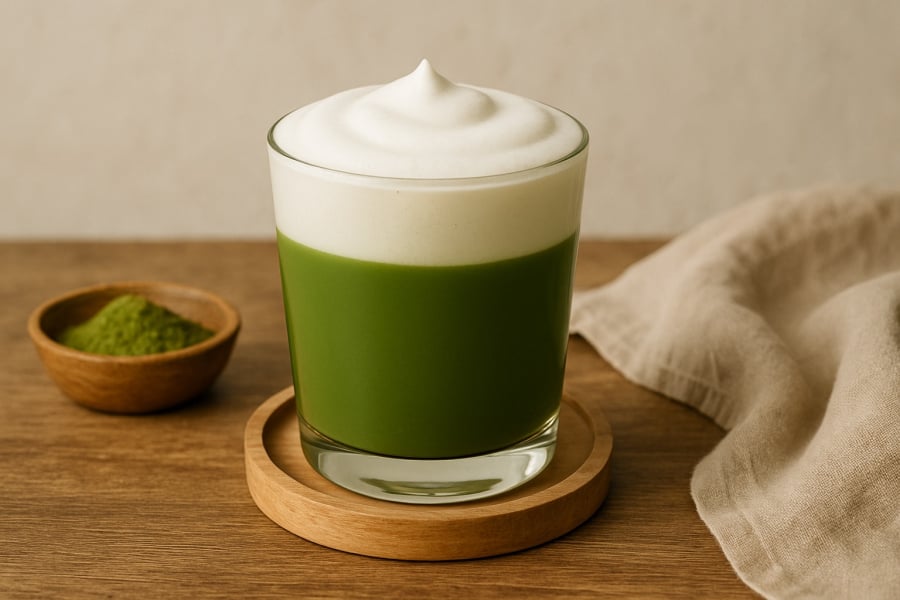Matcha: From Japan to the Globe
Matcha, the finely ground powder of green tea leaves, is an integral part of the Japanese tea ceremony. When you sip matcha, you’re not just drinking a hot beverage but also partaking in an art form. In Japan, matcha is traditionally prepared by whisking the powder with hot water to create a smooth, frothy drink.
Today, matcha has gone global. No longer confined to hot beverages, matcha is now a popular ingredient in lattes, smoothies, and even desserts. What makes matcha so beloved? Perhaps it’s the unique flavor and the myriad health benefits it offers.

How Much Caffeine is in Matcha?
One of the reasons matcha is so popular is its natural caffeine content. But how does it compare to green tea or coffee in terms of caffeine levels? Typically, a cup of matcha contains around 30-60mg of caffeine. In contrast, a cup of regular green tea usually contains about 30-50mg. So, matcha has a slightly higher caffeine content than green tea.
However, when compared to coffee, matcha has a significantly lower caffeine level. An 8-ounce cup of coffee can contain up to 95-200mg of caffeine, while a cup of matcha falls in the range of 30-60mg. This makes matcha an ideal choice for those who want to avoid the jittery or anxious feeling that often accompanies coffee consumption.
Matcha: The Perfect Blend of Alertness and Relaxation
One of the most notable advantages of matcha over coffee is that it provides caffeine along with L-theanine, an amino acid that enhances focus without inducing anxiety or stress. L-theanine slows down the absorption of caffeine, allowing the body to maintain a steady state of alertness over an extended period.
“I drink matcha in the morning to start my day,” shares Minh Anh, an office worker. “Compared to coffee, matcha makes me feel alert without the jitters or anxiety. I can also focus better on my work.” This testimony highlights how matcha is not just an energy-boosting beverage but also an effective mood-enhancing tool.

How to Reduce Caffeine Intake in Matcha
For those concerned about caffeine intake, there’s no need to worry. You can easily adjust the caffeine levels to your preference without having to purchase decaffeinated matcha. Firstly, you can reduce the amount of matcha powder, using just enough to suit your taste. Secondly, adding milk or plant-based milk not only diminishes the caffeine but also enriches the flavor. Additionally, incorporating natural ingredients like ginger, chia seeds, or other herbs can balance the taste while reducing caffeine.
Matcha: The Perfect Choice for Modern Life
With its refreshing flavor, health benefits, and customizable caffeine content, matcha is an ideal beverage for those seeking both alertness and relaxation. Whether you’re a caffeine enthusiast or prefer a milder drink, matcha caters to all tastes. As Mai Anh, a drink reviewer, shares, “Matcha has become my trusted companion during busy days. It keeps me alert yet calm and peaceful.”
Conclusion
Matcha is not just a trendy beverage but also a smart choice for your health. With moderate caffeine levels and the presence of L-theanine, matcha provides sustained alertness and supports your mental and physical well-being throughout the day. Make matcha your daily companion, and experience the difference it brings to your life!
“Don’t Just Use Perilla Leaves, Roll Your Meat Patty with This Leaf for a Tastier and More Nutritious Treat.”
When it comes to grilled minced pork rolls, most people immediately think of using ‘la lot’ leaves (betel leaves). However, by limiting yourself to this leaf, you might be missing out on an even better ingredient: perilla leaves. Perilla leaves are not only more affordable and easily accessible, but they also add a delightful fragrance to the dish, making it a truly memorable culinary experience.
Unveiling Nordic Naturals: The Omega-3 Journey from Sea to America’s Favorite Brand.
As per Spins Live Vibrantly statistics, Nordic Naturals is the leading brand in the United States for sales and volume in the Omega-3 supplements category. This data is aggregated over 52 weeks, up to March 2025, from various channels, including SPINS Total US Natural Enhanced, Total US MULO, E-commerce, Vitamins & Supplements, and Amazon.



































